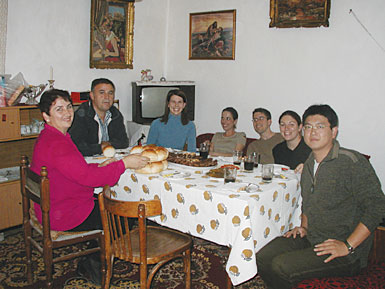Vital Signs
DMS students' eyes are opened by Kosovar exchange
It took a trip to war-ravaged Kosova to help medical student Matthew Weitzel realize he'd learned more than he thought he had at Dartmouth. One of four DMS fourth-years who traveled to the Balkans in October, Weitzel made the discovery when he showed up for rounds one day in the infectious disease clinic at Kosova's University of Prishtina Hospital, but the attending physician didn't. Weitzel and several Kosovar residents—trained in a medical education system that includes little patient contact until residency—would have to handle rounds all by themselves that day.
Clear: Suddenly, it was clear to Weitzel that he'd learned more clinical medicine than he had thought. Even though he hadn't felt like he'd achieved much mastery of medicine during his third-year rotations, he recalls that he was able to formulate diagnoses and evaluate treatment plans with the residents. "What I realized," he explains, "was that my attendings and residents during my third year at Dartmouth had given me a medical curiosity and a way of thinking about medical problems in an expository way."

|
|
Three DMS students—from the right, Chunbai Zhang, Kirsten Redborg, and Matthew Weitzel—were guests in this Kosovar home during a month they spent in Kosova. |
Weitzel's trip was part of the DMS-Kosova Project, a two-way exchange program that is now entering its fifth year. He was joined on this visit by fellow medical students Jennifer Boyle, Kirsten Redborg, and Chunbai Zhang, plus two faculty members —otolaryngologist Dudley Weider, M.D., and family physician Peter Mason, M.D. The DMS visitors to Kosova gain an understanding of a different healthcare system and of the health issues facing a population still recovering from ethnic conflict. The Kosovar visitors to DMS learn ways of doing things that can help them rebuild their warravaged medical system.
City: The exchange is continually evolving. Susan Linsey, coordinator of the project since its inception, mentions a couple of "leaps the program has made in the past year." For example, DMS students have previously stayed in Prishtina, Kosova's capital city, and worked only within the University of Prishtina system. But the four there in October traveled widely and had a chance to work with nongovernmental organizations such as Doctors of the World (DOW). On field trips with these organizations, the students met Kosovars outside the university environment and observed relations between Serbians and Albanians. Boyle, who says her work with DOW "had life-changing perspectives crammed into one week," was especially struck by visits to refugee camps and tuberculosis hospitals.
The DMS students also spent a week observing at primary-care settings outside Prishtina. And they spent the final two weeks of the visit in hospitals, working in specialties such as infectious disease, obstetrics, and emergency medicine.
During their spare time, the students took on individual projects. Weitzel developed a smoking survey and administered it to over 400 medical students and doctors in the hope of ultimately establishing a smoking cessation initiative in Kosova similar to the Live Free-Smoke Free program at Dartmouth.
Boyle laid the groundwork with University of Prishtina students for implementing a community service program similar to DMS's. Redborg worked on a cervical cancer screening project that had been started by Dartmouth ob-gyn Leslie Demars, M.D. And Zhang prepared a presentation on the structure of the American medical education system and also participated in a countrywide measles vaccination project.
Ease: Through their clinical work and their interactions with Kosovar students on these projects, the DMS students gained a new appreciation for the academic resources available in the United States as well as for the general ease of life here. They were moved by the fact that many of the Kosovar medical students they met are not only members of the Kosova Liberation Army but said they'd leave medical school to resume fighting if asked to do so.
With these observations in mind, the DMS students returned to the United States with the hope that more Dartmouth students will follow in their footsteps. Linsey says the longitudinal aspect of the program is one of its strengths—the fact that relationships forged during it are often sustained. The returning students simply point to the warmth of the Kosovar people as a reason to make the trip.
"There's a lot of distrust of Americans throughout the world these days," says Weitzel. "But people in Kosova openly embrace you and welcome you into their community. It is unusual to be welcomed in that way. It is a remarkable experience."
